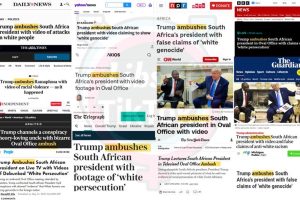
Nigeria: Peaceful Election Transfer, But Boko Haram Attacks Continue
Africa’s most populous nation appears to have achieved a peaceful, historic transfer of power, and averted — at least for now — bloody civil war. But the Islamic terrorist group Boko Haram continues its attacks and Nigeria’s tenuous peace faces many challenges.
General Muhammadu Buhari (shown) and his All Progressives Congress Party (APC) overtook incumbent President Goodluck Jonathan in the March 28 elections, marking the first time that a sitting president has been defeated in a Nigerian election. Since gaining independence from Britain in 1960, the country has seen many coups and conflicts, including a civil war over the southern state of Biafra (1967-1970) that claimed an estimated two to three million lives.
President Goodluck Jonathan’s handover of the government to Buhari and the peaceful transition that has ensued thus far has defied predictions of many analysts who saw post-election violence as all but inevitable, regardless of the outcome. Buhari, a Muslim, and Jonathan, a Christian, represent a religious divide that has been a growing source of strife in the almost evenly divided West African nation. Nigeria’s population of nearly 175 million people is divided between Muslims (about 49 percent), mostly in the northern part of the country, and Christians (about 49 percent), mostly in the south. About two percent still practice traditional animist religions. In addition, Nigeria is home to many different tribal and ethno-linguistic groups with long histories of violent conflict.
The radical jihadist group Boko Haram has carried out an escalating terror campaign over the past decade, targeting Christians and burning hundreds of churches, as well as assassinating government officials and members of police and military units.
President Goodluck Jonathan surprised many observers by conceding defeat and congratulating Gen. Buhari. Although there have been claims of election fraud, Jonathan said he accepted the verdict of Nigeria’s electoral commission, which gave Buhari’s APC a victory margin of more than 2.5 million votes.
President Jonathan called Gen. Buhari on March 31 to concede defeat and express “best wishes” to his opponent. He also urged “those who may feel aggrieved to follow due process … in seeking redress.”
“I promised the country free and fair elections. I have kept my word,” Jonathan said in a statement, according the BBC. A spokesman for Buhari’s All Progressives Congress party praised Jonathan, saying: “He will remain a hero for this move. The tension will go down dramatically.”
Former head of state General Yakubu Gowon says the peaceful conduct of the presidential election and the subsequent peaceful transition has silenced doomsayers who had predicted the breakup of Nigeria in 2015.
“No one will ever repeat that wild and arrogant prediction that Nigeria will go under; those doomsayers have been put to shame and Nigeria will grow from strength to strength,” Gowon told the News Agency of Nigeria.
“The nation has always had the mechanism to tackle its concerns and this election and its peaceful outcome have proved that a united and focused nation would always survive and move toward greatness,” Information Nigeria reported Gowon as saying, on April 7.
Gen. Gowon, who ruled Nigeria for nearly a decade (from August 1966 to July 1975), had come to power through a military coup. After being overthrown himself by a subsequent military coup, Gowon has spent most of the past several decades in exile in Britain. Many critics have laid much of Nigeria’s endemic corruption at Gowon’s feet, pointing out that it was during the country’s oil boom, under his administration, that widespread bribery, cronyism, and nepotism became ensconced, exacerbating conditions that led to the current economic and social crises afflicting the country.
Nigerian corruption is widespread and deep, and there are many competing factions and players vying for a piece of the nation’s oil revenues. There are already reports of infighting for government posts in the new Buhari government. Another factor that will challenge the new government is the ongoing threat from Boko Haram. According to news reports, the militant jihadists killed at least 24 people on Easter Sunday in the village of Kwajafa in northeast Nigeria’s state of Borno. The Boko Haram attackers reportedly arrived at the village disguised as preachers, but opened fire on the civilians they had gathered together, then set fire to houses.
Photo of Muhammadu Buhari: AP Images
Related articles:
Nigeria: Boko Haram Demands Release of Fighters for Kidnapped Girls
Muslim Mob Burns Christian Couple Alive
Islamists Kill Hundreds of Nigerian Christians in Past Two Weeks




